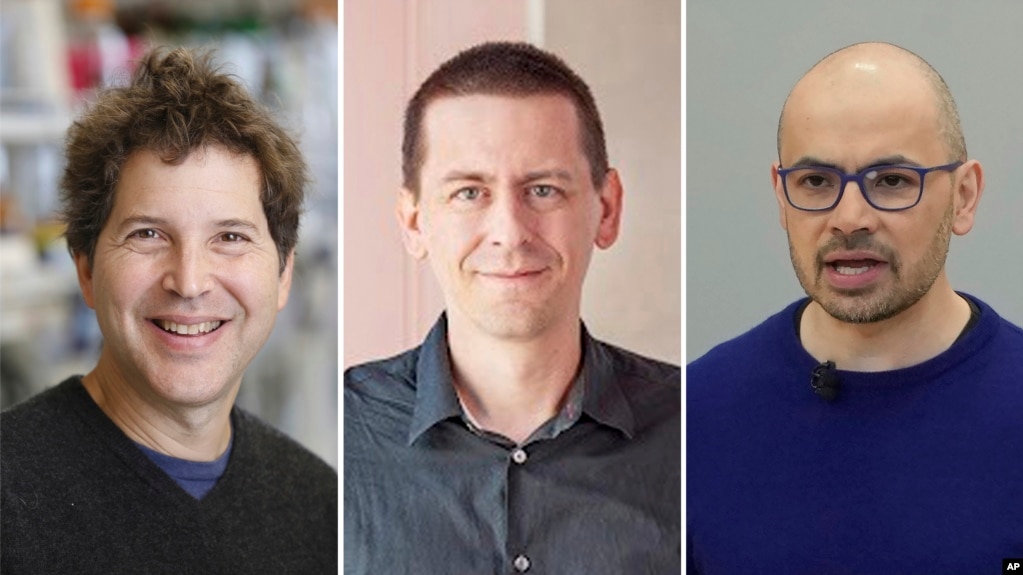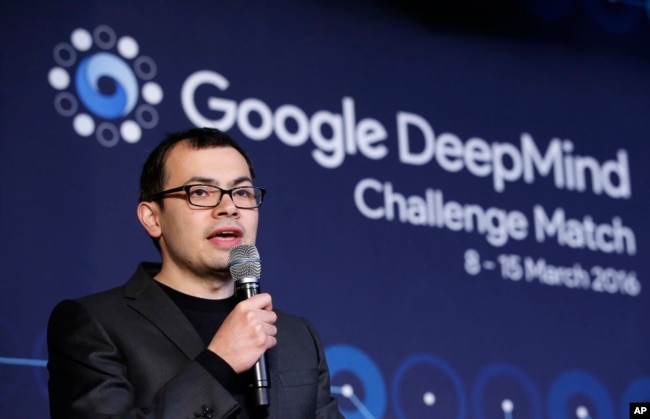AUDIO
Scientists Win Nobel in Chemistry for Predicting, Designing Proteins

Three scientists who developed methods to predict the structure of proteins and build new ones have won the Nobel Prize in Chemistry.
The winners were American David Baker, a professor at the University of Washington; Briton Demis Hassabis, head of Google’s DeepMind research laboratory in London; and American John Jumper, a top researcher at DeepMind. The lab centers on artificial intelligence (AI) methods.
Protein is one of the most important substances to life on Earth. Baker succeeded in building new kinds of proteins. Hassabis and Jumper solved a problem that had existed for 50 years. They were finally able to use AI to predict the structure of proteins.
The Nobel Committee for Chemistry said the discoveries “hold enormous potential.”
For example, committee members said the ability to build new proteins could lead to the discovery of new drugs and vaccines. It could also help scientists develop extremely small materials, called nanomaterials, and small sensors.
Heiner Linke is Chair of the Nobel Committee for Chemistry. He said the award honored research that made connections for the first time between amino acid sequences and protein structures.
“That was actually a grand challenge in chemistry, and in particular biochemistry” for many years, Linke said.
Designing and predicting proteins
Baker first designed a new protein in 2003. Since then, his research group has produced many different proteins. “It seems that you can almost construct any type of protein now with this technology,” said Professor Johan Aqvist of the Nobel committee.
The committee said Hassabis and Jumper created an AI model called AlphaFold2. It has been able to predict the structure of nearly all 200 million proteins researchers have identified.
Linke said, “Proteins are the molecules that enable life. Proteins are building blocks that form bones, skin, hair and tissue.” He added, “To understand how life works, we first need to understand the shape of proteins.”
Linke said that in 2020, Hassabis and Jumper were able to use AI methods to finally “crack the code.” That made it possible to predict the complex structure of “any known protein in nature.”
There are many possible uses for the technology. Researchers should be able to use it to better understand how organisms develop resistance to antibiotics. They might also be able to create images of chemical substances called enzymes that can break down plastic.
The committee said Baker had developed “computational tools” that enable scientists to design new proteins with new shapes and functions.
Baker noted that Hassabis and Jumper’s work in AI had greatly helped his team.
“The breakthroughs made by Demis and John on protein structure prediction really highlighted to us the power that AI could have,” he said. “And that led us to apply these AI methods to protein design and that has greatly increased the power and accuracy.”
Baker was asked during a phone call with Nobel officials and reporters if he had a favorite protein. He said it would be difficult to choose. But he noted that one designed during the pandemic proved to be effective in protecting against the coronavirus.

“And I’ve been very excited about the idea of a nasal spray, of little designed proteins, that would protect against all possible pandemic viruses.” Baker said.
Hassabis is a leader in Britain’s technology industry. He received a knighthood earlier this year for his work in AI. He helped establish DeepMind in 2010. Google later bought the lab.
DeepMind first gained wide attention by developing an AI system that was able to defeat the human world champion in the Chinese game of Go faster than expected.
This year’s Nobel Prize in Chemistry is worth about $1 million. Half of the prize will go to Baker. Hassabis and Jumper will share the other half.
Award ceremonies for the 2024 Nobel Prize winners will be held on December 10.
_____________________________________________
Words in This Story
to crack the code –idiom to discover something that is hidden or very difficult to know
function –n. the job that something does
breakthrough –n. a sudden jump in knowledge or ability
apply –v. to use a method or practice to carry out a task or operation
accuracy –n. exactly showing the true value or condition of something
nasal spray –n. a liquid that is sprayed into the nose to ease discomfort or support health
https://learningenglish.voanews.com/a/scientists-win-nobel-in-chemistry-for-predicting-designing-proteins/7816322.html